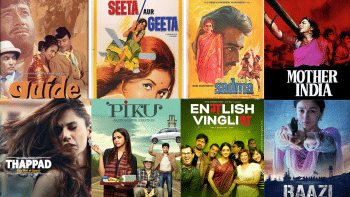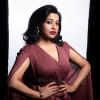5 Bangladeshi female-led films for Women’s Day

From the early days of the blossoming Bangladeshi film industry, there have been very few female-led films. To be even more specific, the stream of female led films have been sparse, from the time of independence to the booming era of the mid-2000s.
Here is a list of five films where women took the lead.
"Golapi Ekhon Traine" (1978)
Directed and written by Amjad Hossain, the official poster of the film itself is a representation of progression. In the signature palette of the 70s, Golapi (Babita) is seen with a smug expression, and a cigarette dangling in her lips. Her demeanor portrays how the society in the film sees her to be-a girl gone astray. In the film, Golapi chooses to work on trains, as a means to sustain her family after her father commits suicide after being unable to pay a hefty dowry for the marriage of his daughter. The film also features ATM Shamsuzzaman, Actor Farooq, Anwar Hossain, Tarana Halim and more.
"Bhaat De" (1984)
Another masterpiece by the director Amjad Hossain, "Bhaat De" is a story of pain and class difference. A nine-time National Film Award winner, Hossain's "Bhaat De" revolves around Jori (Shabana) and her plight to keep her family fed. The film really sheds light on the dual struggle of a woman, that involves taking care of both the external and the internal matters of the household. That is a struggle which is often left unacknowledged.
"Behula" (1966)
An age-old folk-lore presented by the legendary director Zahir Raihan, the story takes a very artistic turn as it is illustrated through the writer-director's eyes. The story of Lakhindar-Behula has always been about female perseverance, one that has transcended ages. I chose the 60s version due to Raihan's attention to detail in art direction. There isn't much you can do about the plot when it is adapted from folklore, but Shuchanda's portrayal of the blushing, yet clueless bride, is a true portrayal of a South Asian bride's experiences.
I find the story of "Behula" parallels that of immigrant marriages, one where the husband leaves his young wife in a completely new environment, fending for herself. That is one story which is way too common in an economically dependent country, beautifully wrapped within the fantastical twines of mythology.
"Ayna" (2006)
Directed and written through the eyes of an iconic woman, Kabori Sarwar encapsulated the story of how a woman grows up in and out of her struggles to forge a life for herself. Starring Sohana Saba and Ferdous Ahmed in the lead roles, I can recall the film in my earliest memories. What my young mind perceived to be a romantic film, in hindsight is a film about how women in reels aren't exactly real. Despite Kusum's soft demeanor and a tinge of quintessential femininity, she doesn't let herself get consumed by it. Which, in my opinion, was a daring representation for the time.
"Rehana Maryam Noor" (2021)
Darker in both story line and colours, "Rehana Maryam Noor" in the gritting female experience held up on screen. Directed by Abdullah Mohammad Saad, the story deals with abuse; an ever-present thunderstorm in every woman's life. Through Azmeri Haque Badhan's portrayal of Rehana, the audiences truly get to understand the hefty price a woman pays to save her dignity. This film echoes the 21st centuries social movements, notably the 'Anti-Rape Movement' and the global #Metoo movement, making people listen to things that have been swept under the proverbial carpet way too many times.
A question the reader might find themselves facing is in a listing of female-led films, majority of the listing is by male directors. Most often, a director is blamed for the lack of representation in the industry, which is not the case. A director delivers what the audience demands, that is how an industry grows. Thus, it is about time we ask ourselves, is our demand for dynamic and intersectional voices sufficient?

 For all latest news, follow The Daily Star's Google News channel.
For all latest news, follow The Daily Star's Google News channel. 









Comments